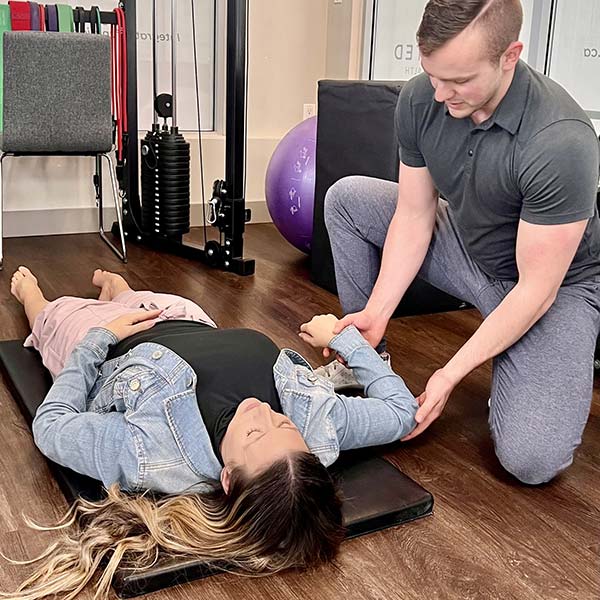Expert Physiotherapy Treatments and Services in Langley and Surrey, BC

Our highly trained therapists excel in the treatment of a wide range of musculoskeletal concerns, assisting patients in restoring their peak functionality and enhancing their overall well-being. The following are only a selection of the conditions we are equipped to manage. We invite you to contact us for a comprehensive evaluation, where we can better understand your unique needs and chart a path toward your well-being.
- Pediatric and Geriatric Therapy
- Sport, AR & work injury rehabilitation
- Pre & Post Surgical Therapy
- Concussion Therapy
- Vestibular Therapy
- Active Rehabilitation
- Shockwave & Laser Therapy
- IMS (intramuscular stimulation)
At Intergrated Functional Health, you can find symptom relief and rehabilitation for:
- Sport, car & work injuries
- Sprains & Strains
- Tendinopathies
- Tendon ruptures
- Carpal Tunnel
- TMJ
- Postural dysfunction
- Neural pain
- Fractures & Dislocations
- Hand injuries
- Headaches & Migraines
- Decreased mobility
- Balance & fall prevention
- Neck & low back pain
- Pregnancy and postpartum dysfunctions
- Persistent pain (Chronic pain, Acute pain, Nerve pain, Phantom pain, Local pain, Referred pain, Mechanical pain, Chemical pain)
- Rheumatoid Arthritis
- Post-Concussion Syndrome
- Post-surgical complications (Ankle fractures, ACL reconstruction, Knee replacement, Hip replacements, Arthroscopic surgeries, Shoulder repairs)
- Running Injuries
- Sciatica
- Shoulder Injuries
What to Expect
For your first visit, allow yourself 50 – 60 minutes from arrival to departure time. This will give you and your Physiotherapist plenty of time to ensure all paper work is done, allow you change time, ensure you receive a thorough assessment and treatment as well as give your Physiotherapist time to talk about their findings and what your ongoing treatment plan will look like.
With your consent, the physiotherapist will ask questions about the pain. It’s best to be honest about the pain or dysfunction that you’re experiencing. The physiotherapist will also look at how you move (e.g. “Lift your arms overhead”), do strength tests, and look at how you walk, for example. Your physiotherapist will also look at areas around the pain, so if your neck hurts, your physiotherapist may look at your shoulders and back. Any pain you share will give your physiotherapist good information. Don’t try to silently endure pain; let your physiotherapist know if something hurts during the assessment.
At the end of the assessment, your physiotherapist may give you a suspected physical diagnosis. You can ask questions like “How long do you think it will take for me to get better?” Your physiotherapist will also let you know that it is normal if you are sore after the assessment for a day or so, and you may also feel tired immediately afterwards. They will also propose a treatment plan based on your goals.
The assessment may end with some treatment to start your recovery. You can consent or decline to any treatment that is proposed. To achieve best results, you will need to do your part in recovery. Just like working out and taking care of yourself, schedule in time to regularly perform any home exercises recommended by your physiotherapist.
Your Physiotherapist may end your hands on treatment and ask you to sit with ice, heat, stimulation or ask you perform a few exercises unassisted. This is sometimes done unassisted and is not included in your hands on time. Please note, you are not charged additionally for this time and your Physiotherapist will remove the modalities and say goodbye to you prior to your departure. Our reception team will ensure you are booked in for any follow up visits prior to exiting.
You will likely be asked to arrive 10-15 minutes prior to your first appointment to ensure all forms have been filled out for the Physiotherapist. These forms may ask for your contact information, health concerns, and previous injuries. If you have extended health benefits and the clinic bills to insurance companies, you may also be asked for this information. You also may be asked to complete a questionnaire, collected on paper or online, to help the physiotherapist understand your concerns.
It is important to wear comfortable, loose clothing. It is helpful to bring clothes to change into such as tank tops / shorts for the appointment so the physiotherapist can look at your posture, joints, and muscles. If you feel uncomfortable, the clinic will have towels or hospital gowns that can help maintain privacy. In addition, our Physiotherapists are trained to work within your comfort level and can make adjustments to assessments if you feel uncomfortable at any time.
Most insures offer coverage for Physiotherapy Appointments under their extended health plans. Please check with your insure prior to your appointment to learn more about your coverage and if a Medical Doctor Note is required. We happily directly bill to most extended health care plans making it convenient and more affordable for you.
You will need to provide our reception team the following prior to your initial appointment: Claim number, Case Managers/Adjuster name and contact information as well as any Medical Doctor referrals you may have.
Your Physiotherapist will spend 40 minutes with you one on one in one of our private treatment rooms. You’ll be asked about your health history, current and past symptoms, previous treatments and any imaging reports you may have. You’ll also be given the opportunity to ask any questions you may have.

To Sum Up Your First Physiotherapy Visit
- Arrive early to fill out forms
- Expect to be there for about an hour
- Wear comfortable, loose clothing
- Be prepared to do movement tests that may hurt
- Treatment may be initiated at the end
- It will be normal to be sore for a day after your assessment
- Hands on time can vary based on individual symptoms and complexity of your case
- Work with your physiotherapist as they are now on your team
Some Information Provided by: Kerry Kittson Physiotherapist
PFC and CPA Awards Manager, Canadian Physiotherapy Association, Physiotherapy Foundation of Canada
Click the Video to Learn More About Vertigo and Science Based Acupuncture and How It Can Benefit You.

